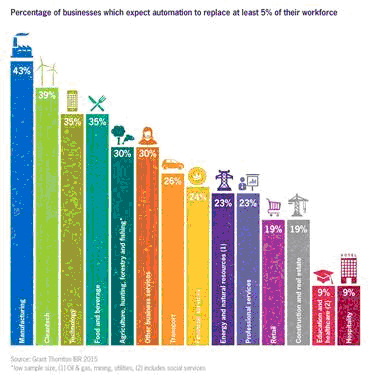According to the information obtained by the researchers, the level of influence of the new technologies on business is quite significant today. Over half the enterprises have automated their core business processes or are in the process of such automation. The executives of these companies expect the automation to bring about higher quality of products, improvement of production efficiency, and, besides, nearly 60% of them suppose the automation will lead to the professional development of the employees, restructuring of the enterprises, transfer of staff to other jobs. And, also, industrial automation is a good opportunity for an employer to reduce the number of employees at the enterprise.

The projections vary substantially depending on the industry. From 9 to 43% of the interviewed executives believe that the automation currently in progress or planned for the next year will allow of staff cuts by at least 5%. The greater number of managers (from 35 to 43%) laying much store on the automation represent industrial sector, cleaning, food industry, hi-tech enterprises. The researchers think these are the industries where most substantial changes in the employment pattern will take place. Tourism, education and healthcare turned out to be most conservative. Only 9% of representatives from these sectors expect noticeable reduction of the number of people employed with the automation in place.
The labor market as we know it today, in the opinion of analysts of Grant Thornton International, is awaiting substantial changes. The data obtained by the researchers show that against the background of reduction of capital costs and growth of the cost of labor we may expect after some time robots to replace human beings in the production processes, at least in some sectors of the economy..
In the opinion of Steven Perkins, the technology section leader of Grant Thornton International, the question is not whether robots will replace people in the technological processes. The history of industrial revolutions proves that the automation facilities will cut down the number of people employed in the production. It is a question of what human skills will be in demand in our digital age, and how to achieve the situation that the employees have the skills required by the employer.
| Recommend | |
|
| |





















